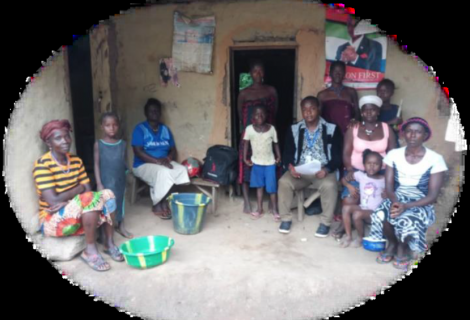
The Impact of Unpaid Care Work on Women’s Economic Empowerment in Sierra Leone
A Scoping Study commissioned by ActionAid Sierra Leone
Across the world, unpaid care work is done predominantly by women. Its invisibility is however mainly due to paucity of data and the lack of a proper means of codifying and enumerating such work. This is an area that has generally been neglected by economists as well as many development actors, especially in developing countries. Yet the amount of unpaid care work done, and the way the burden of this work is distributed across different individuals have important implications for the well-being of individuals and households, as well as for economic dynamism and growth.
Although there exist various empowerment programmes aimed at empowering women economically, socially and politically, the efforts are likely to underperform if considerable time and effort of women and girls is devoted to unpaid care activities.
The policy environment in Sierra Leone is yet to give the required attention in keeping with the provisions of the Sustainable Development Goals, due to absence or insufficient data and proper representation of women’s unpaid care work with its resultant effects on women’s economic empowerment.
This study was inclined to providing the needed information for the development of gender friendly policies and platform for further research. The work took into consideration analysis of time use; capturing unpaid care work in gender-responsive budget initiatives; understanding country circumstances valuing unpaid care work; and Strategies for raising awareness and building capacities.
Sierra Leone has made tremendous progress in the areas of legal protection, education; and some steps forward in financial and digital inclusion. However, much attention is needed in addressing the issue of unpaid care work. The policy environment in Sierra Leone is yet to give the required attention in keeping with the provisions of the Sustainable Development Goals. There are discriminatory clauses in all legal documents appertaining women, but they all stop short in addressing women’s unpaid care work with its resultant effects on women’s economic empowerment.
One of the significant structural barriers to women’s economic empowerment revealed in this survey is women’s disproportionate burden of unpaid work at home, which restricts women from taking up paid jobs, undertaking advanced education and skills training, and participation in public life. This has been partly due to societal, religious and traditional orientation. Nonetheless, translated into monetary terms, UPC accounted for 2.4 time the minimum wage of five hundred thousand leones in Sierra Leone.
Secondly household chores if counted and accounted for, have economic value that can contribute to the Gross Domestic Product (GDP).
The provision of training initiatives, labour-saving technologies and social infrastructure, such as access to water, sanitation, roads and healthcare was found reduce the unequal distribution of unpaid care work between men and women.
Based on the observations made, the following were recommended:
There is need to factor in care as a serious economic and social policy issue, rather than assume that there is an unlimited supply of it flowing from a natural inexhaustible source
In an example of the He4She initiative of the United Nations Women (UN Women) in Sierra Leone, experience suggests that participatory action oriented methodologies, involving both men and women, increases recognition of unpaid care work within communities and key stakeholders.
The ‘Support to Training and Employment Programme for Women (STEP) Scheme’ administered in India for example can impart skills related to employability and entrepreneurship
Identifying all relevant system actors including, market and 'non-market' actors, at the household (including men as well as women), community or government levels and finding incentives and leverage points when addressing unpaid care related constraints will result in increased value.
Promoting the elimination of gender wage gaps and converting unpaid care work into paid jobs, including through state-funded or market-driven care services.
Robust awareness raising through radio and television discussions, jingles, folksongs, music and entertainment industries, and outreach programmes in schools and other public institutions would prove worthy in creating the need transformation.